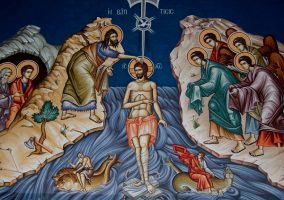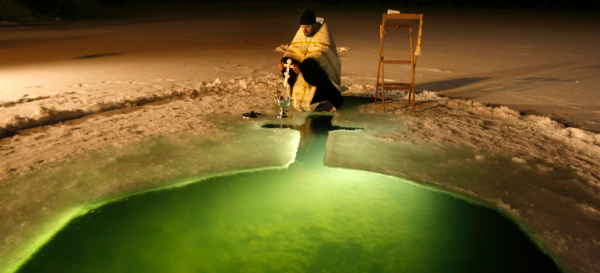I was standing beside the Jordan River, somewhere along its trek through Israel. I was with a group of pilgrims led by Met. Kallistos Ware gathered for the Great Blessing of the Waters. Somehow, it seemed that I was the only priest who had brought an epitrachelion (stole), so I loaned it to the Metropolitan for the service. As the service began, I noticed a school of fish at the edge of the water, watching the bishop as eagerly as the rest of us.
Great art Thou, O Lord, O Lord, and marvelous are Thy works. There is no hymn which suffices to hymn Thy wonders!
The Metropolitan’s voice boomed out across the valley in its Oxford-accented tones, sounding like the voice of God. The area where we had gathered was also marked by small groups of Protestant pilgrims who had apparently gathered to re-baptize one another. At the sound of the Bishop’s voice, everyone stopped to listen.
The words of the prayer over the waters continued. Written by St. Sophronius of Jerusalem in the 6th century, they carried the same style as that of St. Basil: strings of appositives accompanied almost every statement, expanding, echoing, expounding and explaining each phrase with yet more lines of Scripture.
And then something caught my ear that jarred me awake from the cadence of the words:
And grant to it the grace of redemption, the blessing of Jordan.
Now, that’s a very odd statement to make while standing at the waters of the Jordan. Aren’t the waters of the Jordan always the waters of the Jordan? What is the “blessing of Jordan?” Further, the prayer said,
But show this water, O Master of all, to be the water of redemption, the water of sanctification, the purification of flesh and spirit, the loosing of bonds, the remission of sins, the illumination of the soul, the washing of regeneration, the renewal of the Spirit, the gift of adoption to sonship, the garment of incorruption, the fountain of life.
I was already puzzled that we were praying for God to make the Jordan be the Jordan, and now we were asking Him to “show” this water to be a string of marvelous wonders. Shouldn’t we ask Him to “make” it be those wonders?
The answer came with the drop of a theological coin. Fr. Alexander Schmemann taught that, in the sacraments, we are not asking God to make something to be other than it is but to reveal it to be what it truly is. Asking God to show the Jordan to be the Jordan is simply the most blatant example of this principle.
A problem associated with sacramental thought, if this principle is forgotten, is that things that are blessed somehow cease to be what they are. Instead, they become exceptional moments in which the things of this world are no longer things of this world. They change while everything around them remains the same. We go to Church, the miracle happens, but remains confined to the altar or the font, while the world around it remains unchanged. The Church becomes the locus of the extraordinary while the world is stuck in the ordinary. It is, ironically, a two-storey sacramental order. This thing is holy, that thing is not. It is a diminishment of Christ’s work. The sacraments become points of contact with the second-storey, tiny windows in which miniscule rays of sunshine peak out into an otherwise darkened world. But the world itself remains dark.
The nature of the true sacramental understanding is revealed very precisely in the words of St. Sophronius. The Jordan is the Jordan. It is we who fail to see the world as it is. We imagine the world to be self-contained and self-referential. The Jordan is not the Jordan – that’s just a name: it is just some water, hydrogen and oxygen flowing over the surface of the third rock from the sun.
On the 6th of January (19th on the Old Calendar), Orthodox priests across the world, in their many thousands, will stand beside public waters, rivers, creeks, springs, seas and oceans, in some cases hovering over holes piercing through feet of ice, and speak the words of St. Sophronius. All of them will call upon God to send the blessing of the Jordan on the Nile, the Volga, the Mississippi, the Bering Strait, the Bermuda Triangle, the Amazon, the Antarctic, the Yenesei, the Tennessee, the Atlantic and Pacific, the Black Sea and the Aegean, the Clinch River here in Appalachia, and all the waters of the world will be shown to be the Jordan.
The Feast of Christ’s Baptism is called “Theophany.” It means the “showing forth of God.” It is so named because, in the event of Christ’s Baptism, we see Christ, the Son of God, hear the voice of the Father (“Thou art my beloved Son…”), and see the Spirit in the form of a dove. It is a “showing forth” of God as Trinity. But when the Trinity is made manifest, everything is, of necessity made manifest. The truth of all things is revealed.

This “truth of all things” is the revelation of the world as sacrament. The waters and all that is in the world is a means of communion with God because of His Divine condescension. The world was not created to be a place of an “alternative” existence, one without God. It exists as the means and focal point of our communion. The sacraments revealed to us within the life of the Church do not exist as isolated instances of a divine encounter but as examples and revelations of what God is in the world. “Heaven and earth are full of Thy glory.”
This understanding does much to explain Schmemann’s insistence that secularism is the great heresy of our age: it is the denial of the sacramental character of the world. Just as man is created in the image and likeness of God, and thus capable of bearing God’s image, so too, creation has a sacramental and iconic capability. The world is not an impregnable wall that hides us from God. It is the very means by which, and the place in which, God makes Himself known. We were created for communion with God. This takes place here and now, within this world.
St. Maximus the Confessor spoke of a number a cosmic reconciliation, or an overcoming of divisions: male/female, paradise/world, heavenly/earthly, intelligible/sensible, uncreated/created. None of these distinctions disappear, but are fulfilled in their proper role and purpose. The world as sacrament participates in this overcoming of divisions in the union of humanity to God. Our union with the created order, particularly as sacrament, describes the essential priesthood of humanity – “microcosm and mediator,” in the words of St. Maximus.
This is the showing of the world to be what it is meant to be, as well as its revelation to us of ourselves in Christ. And all of creation, like the fish, gathers at our feet to see this strange wonder!















